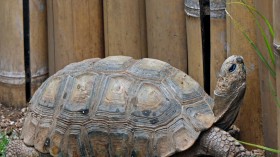It's no secret that babies love a good game of peek-a-boo. Well, it turns out that this type of innocent play can in fact be beneficial to babies, who learn best by being surprised, according to new research.
Infants have an innate knowledge about the world, and when their expectations are defied - for example, when an object doesn't behave the way a baby expects it to - they ultimately learn more from this element of surprise compared to normal situations.
"For young learners, the world is an incredibly complex place filled with dynamic stimuli. How do learners know what to focus on and learn more about, and what to ignore? Our research suggests that infants use what they already know about the world to form predictions. When these predictions are shown to be wrong, infants use this as a special opportunity for learning," Lisa Feigenson, a professor of psychological and brain sciences at Johns Hopkins University, who co-led the study, said in a statement. "When babies are surprised, they learn much better, as though they are taking the occasion to try to figure something out about their world."
In order to determine whether babies learned more effectively about objects that defied their expectations, Feigenson, along with her colleague Aimee E. Stahl, a cognitive psychologist, conducted four experiments involving preverbal 11-month-old babies. The researchers also wondered if babies would seek out more information about surprising objects, and if this exploration meant babies were trying to find explanations for the objects' strange behavior.
First, the research duo showed the babies both surprising and predictable situations regarding an object. For instance, one group of infants saw a ball roll down a ramp and appear to be stopped by a wall in its path. Another group saw the ball roll down the ramp and appear to pass - as if by magic - right through the wall.
When the researchers gave the babies new information about the surprising ball, the babies learned significantly better. In fact, the infants showed no evidence of learning about the predictable ball.
What's more, the researchers found that the babies were more intrigued by the ball that had defied their expectations, compared to the toys that were brand new but had not done anything "magical." They even attempted to better understand these surprising objects - for example, by playing with the balls and testing their solidity by banging it on a table.
"The infants' behaviors are not merely reflexive responses to the novelty of surprising outcomes, but instead reflect deeper attempts to learn about aspects of the world that failed to accord with expectations," Stahl explained. "Infants are not only equipped with core knowledge about fundamental aspects of the world, but from early in their lives, they harness this knowledge to empower new learning."
The findings are described in more detail in the journal Science.
For more great nature science stories and general news, please visit our sister site, Headlines and Global News (HNGN).
© 2024 NatureWorldNews.com All rights reserved. Do not reproduce without permission.





